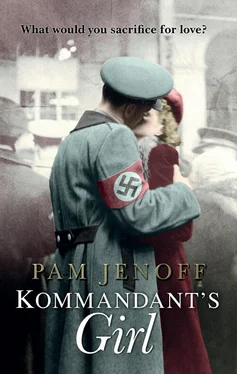One day when I had been working in the nursery for about two months, Pani Nederman came to me, leading a dark-haired girl with her same thick-waisted build by the hand. “Emma, this is my daughter, Marta.”
“Hello!” Marta cried exuberantly, drawing me into a bear hug as though we were old friends. I liked her instantly. A few years younger than me, she had bright eyes that leapt out from behind her improbably large spectacles and wild dark curls that sprung from her head in all directions. She smiled and talked nonstop. Marta’s job in the ghetto was to serve as a messenger for the Judenrat, delivering notes and packages within and sometimes outside the ghetto.
“You must come to our Shabbes dinner,” she declared after we had spoken for a few minutes.
“Your family’s?” I asked, puzzled. People seldom admitted observing the Sabbath in the ghetto, much less invited guests to join them.
She shook her head. “My friends and I have a gathering every Friday night. It is just over there.” She pointed to a building across the street from the orphanage. “I checked ahead of time, when my mother told me about you. They said it is all right for you to come.”
I hesitated, thinking of my parents. Shabbes in the ghetto was just the three of us, but we observed it together every week. My father would smuggle a tiny loaf of forbidden challah out of the ghetto kitchen, and my mother would burn a small amount of our precious remaining candles on a saucer, the candlesticks having been left behind in Kazimierz. Though weary from their long, grueling workweeks, my parents always seemed renewed on Friday nights. Their backs would straighten and the color would return a bit to their cheeks as they chanted the Sabbath prayers in hushed but unwavering voices. We would sit together for hours, sharing the anecdotes we were too tired to relate on other days. I hated to think of leaving them alone, even for a single Friday.
“I’ll try,” I promised Marta, thinking that it was unlikely I would go. In truth, it was not just my parents that concerned me; I was shy, and the thought of walking into a room full of strangers made me nervous. But as the week progressed, I found myself wanting to go with Marta. Finally, on Thursday night, I mentioned it to my parents.
“Go,” they replied at the same time, their faces lifting. “You need some company your own age.”
The next afternoon, when my shift at the orphanage was ending and the children had all been fed, Marta appeared at the door unannounced. “Ready?” she asked, as though my attendance at the dinner had never been in question. Together we walked across the street to Josefinska 13.
Marta led me up a flight of dimly lit stairs and through an unlocked door. The room we entered was long and narrow, with a kitchen off to the right side and another door at the far end. The faded, frayed curtains were drawn. A long wooden table occupied most of the room, surrounded by mismatched chairs. Marta introduced me to the dozen or so young people already gathered in the room, some seated at the table, others milling around. I couldn’t remember most of their names, but it didn’t seem to matter. Newcomers, it appeared, were not unusual, and I forgot to be nervous among the friendly banter. I recognized a few of the people from around the ghetto, but they looked like entirely different people from the somber characters I had seen on the streets. Here, they were energized, talking and laughing with friends as though at a party a million miles from the ghetto.
A few minutes later, someone rang a small bell. As if on cue, everyone quieted and gathered around the table to find seats. Marta led me to two empty places at the end of the table by the front door. Looking around, I counted at least eighteen people. It seemed there would not be room for so many, but everyone jostled and squeezed in. We stood shoulder to shoulder with the others at our respective places in silence.
The door at the far end of the room opened and two men entered. One was stocky and appeared to be in his early twenties, the other slightly taller and older with a trim goatee. They stood at the places that had been left empty at the head of the table. A young woman standing beside the older man lit the candles. The gathering watched in silence as she circled the flames with her hands three times, reciting the Sabbath prayer.
“That’s Alek Landesberg,” Marta whispered, gesturing toward the older man. “He sort of leads this group.”
“Shalom aleichem,” the man began to sing in a rich baritone, and the group all joined in the traditional welcome to the Sabbath. I looked around the table. The faces had been unknown to me an hour ago. Now, bathed in candlelight, they looked as familiar as family. As they sang, their voices rose and formed a tapestry that seemed to separate this place from the horrible, desolate world outside. Tears came to my eyes. Marta, noticing my reaction, squeezed my hand.
When the song was over, we sat down and Alek raised a rusted wineglass and said the kiddush blessing. He then said the motze over the challah before sprinkling salt on it, cutting it and passing it around. The bread was clearly not from the ghetto kitchen; it had a thick crust and a soft inside that reminded me of father’s bakery. As soon as the plate had passed by, I regretted not managing to take an extra piece to take to my parents. Then several girls stood and went to the kitchen and emerged with steaming pots, from which they ladled generous spoonfuls of chicken stock, carrots and potatoes into our bowls. My stomach rumbled. This, too, was obviously not ghetto food.
Throughout the meal, people chattered nonstop. They were friendly, but self-absorbed, and there were many inside jokes, teasing and nicknames that no one bothered to explain to me. I listened with interest as Marta talked over me with the girl to my right about various boys, and then debated with two boys to her left whether the United States would enter the war. I did not mind that no one addressed me directly or asked me questions. At the head of the table, I could see the man who had chanted the prayers looking in my direction. He whispered something to the stocky, younger man on his left. I could feel my cheeks growing flushed in the crowded, too-hot room.
After dinner, as the girls served strong, black coffee in cracked cups with mismatched saucers, a young man produced a guitar and began to play. People pushed back from the table and reclined in their chairs, looking as happy and relaxed as though they were at a spa in Krynice for a summer holiday. We sang and listened for hours to the Yiddish and Hebrew songs, including some that I had not heard in years. Finally, when Marta and I dared stay no longer for fear of the curfew, we thanked the others and left.
From that night onward, I returned to the apartment on Josefinska Street every Friday. I tried to shrug off the guilt I felt at not spending the Sabbath with my parents. For those brief few hours each week, I could forget where I was and all that was going on around me. Shabbes dinner became the highlight of my week.
One Friday night, when I had been coming to Shabbes dinner at Josefinska 13 for about six weeks, Helga, the woman who cooked the dinner each week, approached Marta and me as the evening was ending and we were putting on our coats. “Alek would like to see you,” she said, addressing me.
My stomach jumped. Marta flashed me a questioning look. I shrugged, trying to act nonchalant. “You don’t have to wait for me,” I told her. The woman gestured toward the door at the back of the room. I approached nervously, wondering if perhaps I had done something to offend Alek. But when I knocked on the half-open door, he waved me in affably.
The back room was less than half the size of the front, with a small table covered in papers, a few chairs and a cot. “Emma, I’m Alek,” he said warmly, extending his hand. I shook it, surprised he knew my name. Alek introduced the man who had been seated beside him at dinner. “This is Marek.” The other man nodded and, gathering a stack of papers from the table, excused himself from the room. “Have a seat.” I perched on the edge of the chair Alek had indicated. Up close, I could see the dark circles and fine lines around his eyes. “I apologize for not introducing myself sooner, but I have had pressing business.” I wondered what kind of business one could have in the ghetto. “Emma, let me be blunt.” He lowered his voice. “We have a mutual friend.” His eyebrows lifted. “A very close friend. From the university.”
Читать дальше












